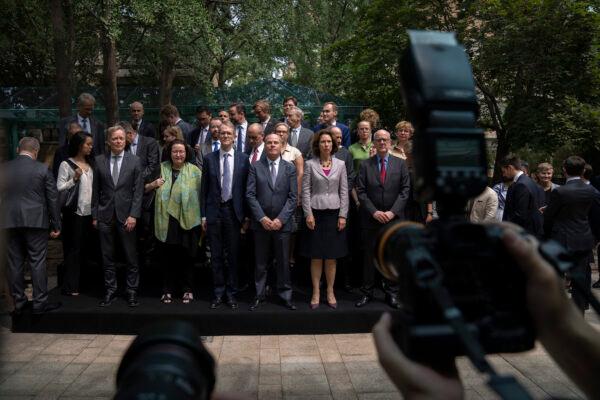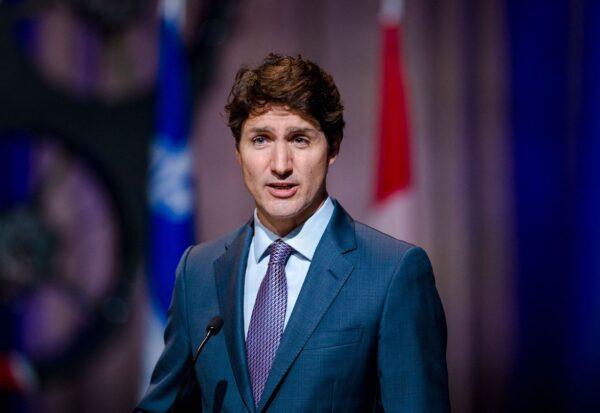The United States and the international community issued statements in a growing chorus in protest of China’s hefty sentencing of Canadian businessman Michael Spavor.

Canadian Prime Minister Justin Trudeau immediately condemned Spavor’s sentencing, calling the verdict “absolutely unacceptable and unjust.”
Further statements were released by officials around the world denouncing the Chinese Communist Party’s (CCP) actions, with U.S. Secretary of State Antony Blinken calling on the CCP to release Spavor and another Canadian, Michael Kovrig, “immediately and unconditionally.”
“We continue to condemn these arbitrary detentions as well as the sentence imposed against Mr. Spavor,” Blinken said in an Aug. 11 statement, adding: “The practice of arbitrarily detaining individuals to exercise leverage over foreign governments is completely unacceptable. People should never be used as bargaining chips.”
Spavor and Kovrig were arrested in China in December 2018 and were later charged with espionage. Their arrests came days after Huawei Chief Financial Officer Meng Wanzhou was arrested at Vancouver International Airport on a U.S. extradition warrant.

Meng is accused of being involved in a scheme to use the global banking system to evade U.S. sanctions against Iran. The two men’s detentions were widely seen as a tit-for-tat response by the CCP over her arrest.
Other U.S. officials also raised their voices against Spavor’s verdict, with Sen. Jim Risch (R-Idaho), the ranking Republican member on the Senate Foreign Relations Committee calling the sentencing a “clear political move” and “despicable.”
“No internationally respected government arbitrarily detains foreign nationals,” he said, demanding the release of Spavor and Kovrig.
U.S. Rep. Ami Bera (D-Calif.), who chairs the House Foreign Subcommittee on Asia, condemned the CCP’s sentencing of Spavor and called on the CCP to “cease its use of hostage diplomacy.”

A spokesperson for the Chinese Embassy in Canada in a statement accused Canada of “ganging up” with other Western countries to “put pressure on China,” efforts it called “totally in vain.”
Meanwhile, Melita Gabric, European Union ambassador to Canada, said in a statement that the EU urges China to “respect its international legal obligations.”
“Arbitrary detentions violate [human rights] and the independence of the judiciary,” she said, adding that the EU has “stood shoulder to shoulder with Canada” in efforts to secure Spavor and Kovrig’s release.
The British high commissioner to Canada expressed solidarity with Canada in a brief statement.
Separately, the German Foreign Office issued a statement in a similar fashion. German Foreign Minister Heiko Maas also said that Spavor’s rights were “restricted in breach of international law,” and further noted that his trial was “held behind closed doors.”
Spavor was charged in China with espionage in June 2019. A one-day trial was concluded in March and the Chinese court waited until Aug. 11 to announce its verdict.
The sentence was announced within a day of lawyers for Canada’s attorney general arguing in a Canadian court against a request to delay the extradition of Meng to the United States to face criminal charges.
France’s Ministry for Europe and Foreign Affairs said in a statement it was “dismayed” to learn about Spavor’s sentencing and Schellenberg’s upheld death sentence and said it “strongly denounces the arbitrary nature of these verdicts.”
Meanwhile, Annika Ben David, Sweden’s ambassador-at-large for human rights, democracy, and the rule of law, called to restore the human rights of Spavor and Schellenberg. “[Human rights] obligations must be ensured, including the right to a fair trial [and] the right to life,” she said in a statement.
Australia and New Zealand both condemned the latest situation concerning Spavor and Schellenberg.
“We call for due process and transparency and oppose the death penalty in all circumstances,” the Australian Department of Foreign Affairs and Trade said in a statement.
“Aotearoa of New Zealand shares Canada’s deep concerns and continues to follow this and similar cases closely. We call for international law and norms to be respected, including human rights and the Vienna Conventions,” according to a statement from New Zealand’s Ministry of Foreign Affairs and Trade.




